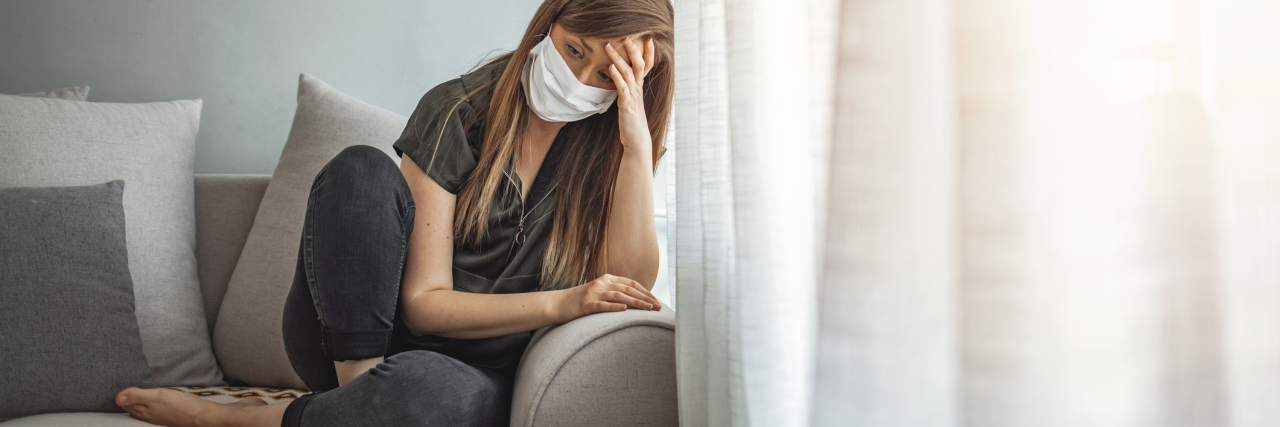Why Some People Seem to Be Less Anxious About COVID-19 Now
Pandemic fatigue. By this point, you’re probably reading about it, hearing about it and even experiencing it yourself. It’s the phrase used to describe being utterly fatigued and exhausted by the coronavirus (COVID-19) pandemic and all the havoc and heartbreak it has caused, as well as all the rules and regulations that have been put in place to slow the spread. Simply – it’s the justification being used to explain why people are going out more and social distancing less, even as the pandemic rages on and cases reach record numbers.
Pandemic fatigue is a fair way to describe this feeling; we are fatigued. It’s been a long nine months. But, psychologically speaking, it’s more nuanced than “just fatigue.” Psychologically speaking and evolutionarily speaking, we are responding to a prolonged period of stress and anxiety the only way our brains and bodies know how — by habituating to the threat and returning to mental homeostasis because our brains are not equipped or prepared to handle this level of activation forever.
Let me explain. I was hesitant to even write this piece because it is a controversial topic, and I encourage you to please read beyond the headline. I am all-in for continued social distancing and other rules and restrictions to keep everyone safe from this virus. I know that now is not the time to let our guard down or get complacent, nor am I suggesting that it is OK to do so. But it might be helpful to understand why, from an anxiety-treatment perspective, some people may be beginning to find it easier to engage in “normal” activities without as much fear or worry as we all had earlier this year. This perspective is especially true for people who have not contracted the virus or had a mild case and have since recovered.
For people with intense fears such as those associated with obsessive-compulsive disorder (OCD) or other anxiety disorders (such as phobias), a method of therapy known as exposure and response prevention (ERP) is the gold-standard approach. Explaining ERP is an article of its own, but the core idea is that with continued, prolonged exposure to a feared stimulus, without the threatening situation coming to fruition as expected, the brain and the body will eventually habituate, and anxiety will subside. For example, if a person with OCD has a fear of germs or getting sick, they might practice overcoming this fear by touching doorknobs and then not washing their hands before eating. I realize this is a simple example and explanation of OCD/ERP, but it is helpful to understand the overall concept. With time, the person engaging in this type of mental exercise retrains their brain and realizes that the feared threat (i.e., getting sick or contaminating others) has not come to fruition (or was not as bad as anticipated) and the situation is no longer as scary or anxiety-inducing.
Additionally, the person’s level of distress (often called “subjective units of distress,” or SUDs) subsides, their parasympathetic nervous system is activated, and the fight-or-flight response that is associated with anxiety begins to dissipate. This habituation and the gradual decrease in anxiety is evolutionary – our bodies are not able to sustain high levels of activation and arousal for too long without becoming exhausted. ERP works well for so many people with OCD and phobias because it teaches our brains how to sit with the anxiety, fear and uncertainty, and learn that the fears will most likely not come true (or, if they do, we can handle it). It’s a protective, beneficial and natural way for our bodies and our brains to respond to stimuli and survive.
So, let’s consider this in the context of the current COVID-19 pandemic. When the pandemic first began impacting us, there was an intense response of anxiety, fear and compulsive behaviors. People started hoarding toilet paper and soap, sanitizing anything and everything, and living in a near-constant state of panic and arousal. Many of those around us fell ill with the virus. Thousands of people were dying each day. The fear was real, and the threat was coming to fruition before our eyes.
We lived in this state of hyperarousal for months. We had to, for our own safety, and for the safety of everyone else. Our fight-or-flight systems were activated. We were scared, overwhelmed, uncertain and shaken to the core.
And now we’re tired. Our brains and our bodies are tired. We are habituating to the anxiety in the only way that human beings know how. We are getting used to it and becoming less anxious. This, again, might be especially true for those who have not yet had the virus or who had a mild case. We can know that people are dying and this virus is devastating and still be becoming desensitized to the anxiety because, from an evolutionary and biological perspective, that’s how we survive. Even the most caring, intelligent and selfless people might appear to be acting in risky or more reckless ways. “Pandemic fatigue” is an accurate description for what we are experiencing right now, but it’s more than just being “tired”. It’s even more than just being exhausted. We are coping and trying to survive, and we simply cannot function as human beings in a highly activated and aroused state; we are not wired for it.
Again, I am not implying that we give in to this complacency and stop working to actively keep ourselves and others safe during this pandemic. But it’s interesting to consider why some people around you might be loosening their diligence and are seemingly less anxious about contracting the virus, despite knowing that cases are rising and the pandemic is still very much active. In order to continue to follow the rules and regulations and stay safe during this time, we have to fight back against what our brains and bodies naturally want to do right now, nine-plus months into a state of hyperarousal. People are fatigued, but for the vast majority, it is not because they are lazy, selfish or careless. Our brains and bodies are just trying to keep us alive in the best way we know how.
So, this is unprecedented territory. Our primitive survival mechanisms are being called into question. We have seen more loss, pain and grief this year than anyone should ever have to experience. Intense uncertainty surrounds us every moment.
Continue to be gentle with yourself, and gentle with others as well. Thank the essential workers in your life. Do good deeds when and where you can. And please, wear a mask. I’ll let you in on a little secret — our brains and our bodies are also pretty good at resilience, too.
A version of this article was published on Psychology Today.
Getty Images photo via dragana991


